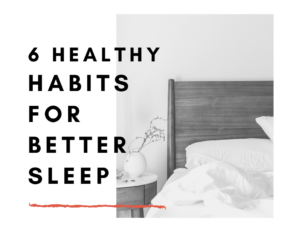Everyone knows good quality sleep is a must to keep our body systems working optimally, but sleep is so often elusive or set on the back-burner in place of “productivity.”
So many factors can contribute to poor sleep – stress, responsibilities, unexpected changes, challenges or illness, but creating a healthy routine around bedtime can drastically improve your chances of catching some quality zzzz’s.

Take a scroll below to check out five of our favorite sleep encouraging habits!
LIMIT SCREEN TIME AT NIGHT
Screen time at night keeps adults from falling asleep and sleeping well due to cognitive stimulation and sleep deprivation. Your brain’s electrical activity increases, neurons race and divert you from calming down into a peaceful state of mind for sleep.
And let’s be real..responding to that email your boss just sent you is likely to increase the stress and tension in you body. Your body then releases the cortisol, the stress hormone, further keeping you wide eyed and unrestful.
Our advice? Turn off the screens (tv, phone, computer, tablet…what else is there!?) at least an hour before you wish to fall asleep. Give your brain a rest and a signal that it’s time to sleep.
PAY ATTENTION TO WHAT (AND WHEN) YOU EAT AND DRINK BEFORE BED
Now we aren’t saying you need to go to bed hungry! But limiting snacking as you close in on bedtime is a good idea. If your body is busy digesting, it probably isn’t busy resting… That goes for alcohol too! While a glass of wine or a night cap might make you feel sleepy, it certainly has its disruptive qualities later in the night.
If you’re starving or are indulging in a snack before bed, try a banana, handful of walnuts or almonds as they’re all full of magnesium and support melatonin production.
SET THE TONE
Create a room that’s ideal for sleeping. Often, this means cool, dark and quiet. Exposure to light might make it more challenging to fall asleep. Consider using room-darkening shades, earplugs, a fan or other devices to create an environment that suits your needs.
Doing calming activities before bedtime, such as taking a bath or using relaxation techniques, might promote better sleep. Evening yoga, a cup of chamomile tea and a book, anyone?
GET INTO THE ROUTINE AT THE SAME TIME EACH NIGHT
Set aside no more than eight hours for sleep. The recommended amount of sleep for a healthy adult is at least seven hours. Most people don’t need more than eight hours in bed to achieve this goal.
Go to bed and get up at the same time every day. Try to limit the difference in your sleep schedule on weeknights and weekends to no more than one hour. Being consistent reinforces your body’s sleep-wake cycle.
There’s even a handy dandy feature on your iPhone that lets you set recurring sleep and wake timers!
Note: If you don’t fall asleep within about 20 minutes, leave your bedroom and do something relaxing. Read or listen to soothing music. Go back to bed when you’re tired. Repeat as needed.
MOVE YOUR BODY
Spending time outside as well as daily physical activity can encourage restful, good quality sleep and can even contribute to falling asleep faster. Avoid intense physical activity too close to your bedtime, as the extra endorphins could keep you awake longer than you’d like.
DIM THE LIGHTS BEFORE BED
For most of history, us humans didn’t have to seek out darkness for sleep. The invention of electrical light inadvertently changed the way we approach sleep and night time routines.
Artificial light, inexpensive and ever-present, wreaks frequent havoc on sleep without many people even being aware of its detrimental effects. The widespread use of digital technology—and the light emitted from all those screens—has introduced another highly disruptive challenge to sleep.
Light has a profound effect on sleep. Exposure to light early in the day stimulates the body and mind, encouraging feelings of wakefulness, alertness, and energy. Light exposure at night also stimulates alertness—and that can pose a serious problem for healthy, abundant, refreshing sleep. Light exposure during the evening can make it harder to fall asleep. Insufficient darkness throughout the night can lead to frequent and prolonged awakenings.
So – the lesson here? Dim your lights as the sun sets or at least an hour for bed and create a dark environment to rest your head.
